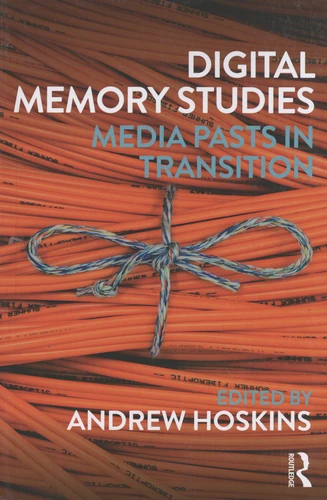Digital Memory Studies. Media Pasts in Transition
Par :Formats :
Définitivement indisponible
Cet article ne peut plus être commandé sur notre site (ouvrage épuisé ou plus commercialisé). Il se peut néanmoins que l'éditeur imprime une nouvelle édition de cet ouvrage à l'avenir. Nous vous invitons donc à revenir périodiquement sur notre site.
- Réservation en ligne avec paiement en magasin :
- Indisponible pour réserver et payer en magasin
- Nombre de pages313
- PrésentationBroché
- FormatGrand Format
- Poids0.48 kg
- Dimensions15,0 cm × 23,0 cm × 1,8 cm
- ISBN978-1-138-63938-6
- EAN9781138639386
- Date de parution01/01/2018
- ÉditeurRoutledge
Résumé
Digital media, networks and archives reimagine and revitalize individual, social and cultural memory, but they also ensnare it, bringing it under new forms of control. Understanding these paradoxical conditions of remembering and forgetting through today's technologies needs bold interdisciplinary interventions. Digital Memory Studies seizes this challenge and pioneers an agenda that interrogates concepts, theories and histories of media and memory studies, to map a holistic vision for the study of the digital remaking of memory.
Through the lenses of connectivity, archaeology, economy, and archive, contributors illuminate the uses and abuses of the digital past via an array of media and topics, including television, videogames and social media, and memory institutions, network politics and the digital afterlife.
Through the lenses of connectivity, archaeology, economy, and archive, contributors illuminate the uses and abuses of the digital past via an array of media and topics, including television, videogames and social media, and memory institutions, network politics and the digital afterlife.
Digital media, networks and archives reimagine and revitalize individual, social and cultural memory, but they also ensnare it, bringing it under new forms of control. Understanding these paradoxical conditions of remembering and forgetting through today's technologies needs bold interdisciplinary interventions. Digital Memory Studies seizes this challenge and pioneers an agenda that interrogates concepts, theories and histories of media and memory studies, to map a holistic vision for the study of the digital remaking of memory.
Through the lenses of connectivity, archaeology, economy, and archive, contributors illuminate the uses and abuses of the digital past via an array of media and topics, including television, videogames and social media, and memory institutions, network politics and the digital afterlife.
Through the lenses of connectivity, archaeology, economy, and archive, contributors illuminate the uses and abuses of the digital past via an array of media and topics, including television, videogames and social media, and memory institutions, network politics and the digital afterlife.

